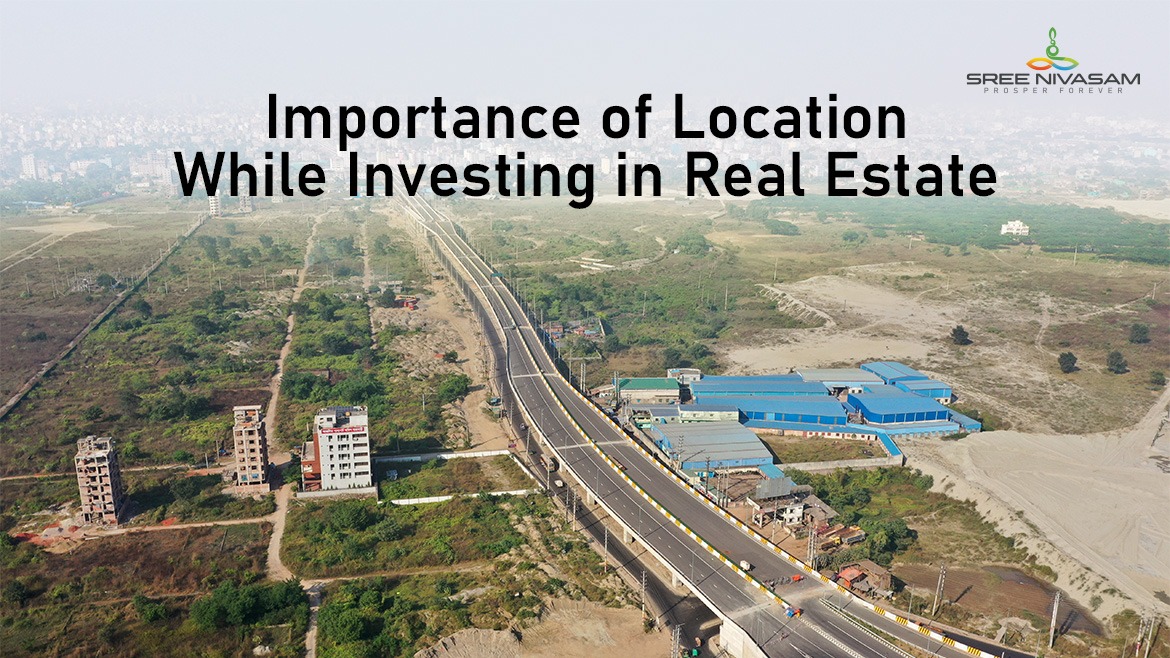Importance of Location When Investing in Real Estate: Key Factors Driving Capital Appreciation
Investing in real estate is one of the most reliable ways to build wealth over time, but not all properties offer the same potential for growth. The single most crucial factor in determining a property’s future value is its location. Whether you’re buying a home for personal use or as an investment, understanding the importance of location can help you achieve maximum returns on your investment. Let’s explore the key factors that drive capital appreciation and why they should be top of mind when selecting a property.
1. Government-Initiated Projects
Government projects can significantly boost the value of surrounding real estate. Projects like Future City at Mucherla in Hyderabad are prime examples. Envisioned as a mega hub for IT, biotech, and research, the city’s infrastructure will attract major investments and generate employment, thus driving up demand for housing and commercial spaces. Such government-backed initiatives often serve as catalysts for accelerated real estate growth.
2. Connectivity
Proximity to key transportation hubs and major roadways is a critical factor in real estate investment. Properties near highways, Outer Ring Road (ORR), railway stations, and airports tend to appreciate faster due to improved accessibility. For example, properties around Hyderabad’s Rajiv Gandhi International Airport or close to the ORR have seen a consistent rise in value due to the convenience of seamless travel. Additionally, the development of new metro rail lines or upcoming expressways increases connectivity and drives long-term appreciation.
3. Employment Opportunities
Another critical factor in capital appreciation is the availability of employment hubs in the area. Locations close to Special Economic Zones (SEZs), IT parks, or manufacturing hubs tend to have a higher demand for housing. In Hyderabad, for instance, areas surrounding HITEC City, Gachibowli, and Financial District have witnessed rapid real estate appreciation due to their status as IT and corporate hubs. Similarly, the Foxconn manufacturing plant and other developments near Kokapet and Shamshabad have made these areas hotbeds for real estate investment.
4. Infrastructure Development
Investing in an area with strong infrastructure development is a smart move. High-quality roads, drainage systems, reliable electricity, and water supply can significantly boost property values. Locations close to planned infrastructure projects like the Hyderabad Metro Rail expansion or the construction of new flyovers can experience a surge in demand and price. Additionally, access to social infrastructure such as schools, hospitals, shopping malls, and entertainment zones also contributes to the overall desirability of an area.
5. Future Growth Prospects
Identifying areas with high future growth potential can result in significant capital appreciation over time. Locations around upcoming smart cities, industrial corridors, or newly proposed townships are great examples of high-growth potential areas. For instance, areas around proposed Future City in Mucherla, touted to become the world’s largest integrated pharmaceutical manufacturing cluster, hold great promise for future growth.
6. Supply and Demand Dynamics
The fundamental principle of supply and demand applies to real estate as well. A limited supply of land in well-connected areas with growing employment opportunities results in higher property values. Meanwhile, increasing demand from migrating populations and professionals looking for convenient housing near their workplaces leads to consistent price appreciation. This dynamic is particularly visible in areas near IT corridors, SEZs, and industrial zones.
7. Connectivity to Employment Hubs
Easy access to major employment hubs is one of the primary drivers of capital appreciation. Areas around established employment zones such as Kokapet, Financial District, and upcoming Future City at Mucherla benefit from a steady influx of working professionals seeking accommodation nearby. This demand ensures a robust rental market and increased property prices in the long run.
8. Zoning Laws and Land Use
Local zoning laws and land-use regulations such as 𝗛𝗠𝗗𝗔 𝗠𝗮𝘀𝘁𝗲𝗿 𝗣𝗹𝗮𝗻, DTCP & RERA can also impact property values. Areas where government initiatives and policies favor real estate development, such as the creation of mixed-use developments, business parks, and residential areas, tend to appreciate more quickly. For example, the Telangana government’s investor-friendly policies and the development of Future City are clear indicators that the area is being primed for growth, and early investors stand to benefit from long-term appreciation.
9. Safety and Livability
Safety and quality of life also play a crucial role in determining the appeal of a location. Properties in neighborhoods known for their security, clean surroundings, and well-maintained public spaces tend to appreciate faster. The presence of high-quality schools, healthcare facilities, and recreational spaces enhances the overall livability, attracting more buyers and tenants to the area.
When investing in real estate, choosing the right location is key to ensuring long-term capital appreciation. By focusing on areas with strong government-backed projects, excellent connectivity, employment potential, robust infrastructure, and future growth prospects, investors can maximize their returns.
Invest smart by considering these factors, and your real estate investment could prove to be a goldmine! Our professional property advisors at Sree Nivasam Infra LLP could help your real estate investment journey be fruitful.
Call Us Now @ 8799998989 for Our Projects Details and Schedule a Site Visit.

